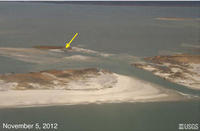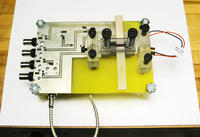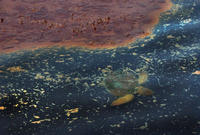-
Instant DNA analysis worries privacy advocates
In the past, it took weeks to analyze a person’s DNA, but with new technology it can take less than a day, and in most cases less than two hours; Rapid DNA analyzers can process a DN sample in less than ninety minutes; these machines, the size of a household printer, are now being marketed to local, state, and federal law enforcement agencies around the country; privacy advocates worry
-
-
Laser weapon tracks, destroys drones, mortar rounds in mid-flight
A 50kW high energy laser (HEL) weapon technology demonstrator successfully passed demanding tests in Switzerland; in the first test, a massive, 15mm-thick steel girder was cut through from a distance of 1,000 meters; even more impressively, the HEL shot down several nose-diving target drones at a range of two kilometers; the drones were flying at speeds over 50 meters a second, but the system’s radar had no trouble picking up the incoming unmanned aerial vehicles at a distance of three kilometers, before they were destroyed by the laser beam at a 2-km range; the HEL also tracked and destroyed a steel ball measuring 82 mm in diameter and travelling at approximately 50 m/sec – replicating a mortar round – in mid-air
-
-
Shoring up Long Island’s natural shore defenses against future storms

Sand and other coarse-grained sediments are vital to the naturally occurring barrier systems which dissipate storm surges, protect coastal residences, and shelter biologically diverse estuaries and ecosystems; a team of researchers is conducting marine geophysical surveys of the seafloor and shallow subsurface to assess the health of the offshore barrier system which protects the New York Harbor and southwestern Long Island region against damage from future storms
-
-
Fish zapping: shocking Asian carp out of Midwest waters not feasible
The several species known as Asian carp are not native to U.S. waterways but have been found in rivers throughout the Midwest; these fish are competing with native species for food and altering ecosystems; they are also dangerous to boaters and other river users since Asian carp can weigh up to sixty pounds and are known to jump out of the water during even minor disturbances; scientists had hoped to modify or expand low-voltage electrical barriers like those used around Chicago waterways to direct Asian carp from particular areas, but found that the level of electricity needed would be far too high
-
-
New York State power plants showing their age

New York State could face power plant closings in the near future as a result of updated environmental regulations and the fact that plants in the state are outdated and inefficient; a recent report concluded that New York’s coal and nuclear power plants, as well as steam and turbine plants that run on oil or gas, are on average older than others around the country
-
-
A 1-kilometer-long electric sail tether brings space sailing closer
The electric sail (ESAIL) produces propulsion power for a spacecraft by utilizing the solar wind; the sail features electrically charged long and thin metal tethers which interact with the solar wind; using ultrasonic welding, researchers have successfully produced a 1-km long ESAIL tether; the produced tether proves that manufacturing full size ESAIL tethers is possible; the theoretically predicted electric sail force will be measured in space during 2013
-
-
Portable X-ray source offers a mobile terrorism prevention tool

The hand-held scanners, or tricorders, of the Star Trek movies and television series are one step closer to reality now that a engineers have invented a compact source of X-rays and other forms of radiation; the radiation source, which is the size of a stick of gum, could be used to create inexpensive and portable X-ray scanners for use by doctors, as well as to fight terrorism and smuggling and aid exploration on this planet and others
-
-
A dandelion-shaped device to help in demining operations
Decades of war have left land mines buried all over the Afghan countryside; they continue to go off, killing and maiming hundreds of innocent people every year; last year alone, more than 812 people were wounded or killed in Afghanistan because of mines left behind after the armies retreated; two Afghan inventors designed a dandelion-like device for demining operations
-
-
"Prophylactic dressing" for walls make buildings safer during earthquakes
In the case of earthquakes, only seconds may remain for a safe escape from buildings; debris falling down and obstructing the escape routes may even aggravate the situation; a new product extends the time for saving lives by reinforcing walls and keeping off the debris; an innovative building material manufacturer now has launched the mature innovation in the market
-
-
Assessing future sea level rise from ice sheets
Future sea level rise due to the melting of the Greenland and Antarctic ice sheets could be substantially larger than estimated in Climate Change 2007, the Fourth Assessment Report of the IPCC, according to new research
-
-
BP settlement includes $350 million funding for Gulf health, environmental protection

As part of the $4 billion settlement announced last month between the federal government and BP concerning the 2010 Deepwater Horizon disaster, the National Academy of Sciences has been asked to establish a new $350 million, 30-year program on human health and environmental protection in the Gulf of Mexico
-
-
Free STEM search engine is now mobile
Gooru — a free search engine for learning that brings together science, technology, engineering, and mathematics (STEM) educational materials on the Web — developed the Gooru Collections iPad app to bring thousands of assorted multimedia resources to teachers and students on the go
-
-
Neuroscience study reveals new link between basic math skills and PSAT math success
New research provides brain imaging evidence that students well-versed in very basic single digit arithmetic (5+2=7 or 7-3=4) are better equipped to score higher on the Preliminary Scholastic Aptitude Test (PSAT), an examination sat by millions of students in the United States each year in preparation for college admission tests
-
-
Smartphones turned into secure and versatile keys
It is already possible to open doors using an app — but we are a long way from seeing widespread acceptance of this in the market; now, researchers have developed a piece of software that will make the technology even more secure and versatile
-
-
Political action the biggest swing factor in meeting climate targets: study
The new study examines the probability of keeping average global temperatures from rising more than 2°C above preindustrial levels under varying levels of climate policy stringency, and thus mitigation costs
-
More headlines
The long view
Autonomous Vehicle Technology Vulnerable to Road Object Spoofing and Vanishing Attacks
Researchers have demonstrated the potentially hazardous vulnerabilities associated with the technology called LiDAR, or Light Detection and Ranging, many autonomous vehicles use to navigate streets, roads and highways. The researchers have shown how to use lasers to fool LiDAR into “seeing” objects that are not present and missing those that are – deficiencies that can cause unwarranted and unsafe braking or collisions.
Tantalizing Method to Study Cyberdeterrence
Tantalus is unlike most war games because it is experimental instead of experiential — the immersive game differs by overlapping scientific rigor and quantitative assessment methods with the experimental sciences, and experimental war gaming provides insightful data for real-world cyberattacks.
Prototype Self-Service Screening System Unveiled
TSA and DHS S&T unveiled a prototype checkpoint technology, the self-service screening system, at Harry Reid International Airport (LAS) in Las Vegas, NV. The aim is to provide a near self-sufficient passenger screening process while enabling passengers to directly receive on-person alarm information and allow for the passenger self-resolution of those alarms.
Falling Space Debris: How High Is the Risk I'll Get Hit?
An International Space Station battery fell back to Earth and, luckily, splashed down harmlessly in the Atlantic. Should we have worried? Space debris reenters our atmosphere every week.
Testing Cutting-Edge Counter-Drone Technology
Drones have many positive applications, bad actors can use them for nefarious purposes. Two recent field demonstrations brought government, academia, and industry together to evaluate innovative counter-unmanned aircraft systems.
Strengthening the Grid’s ‘Backbone’ with Hydropower
Argonne-led studies investigate how hydropower could help add more clean energy to the grid, how it generates value as grids add more renewable energy, and how liner technology can improve hydropower efficiency.
